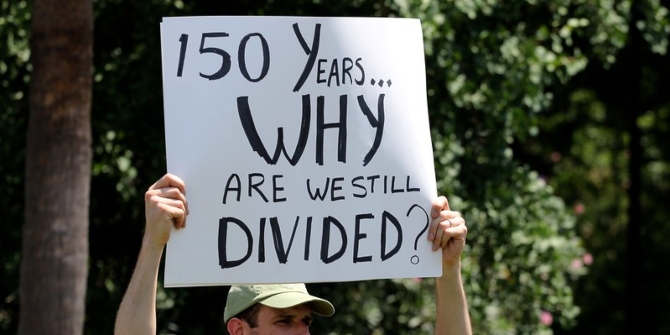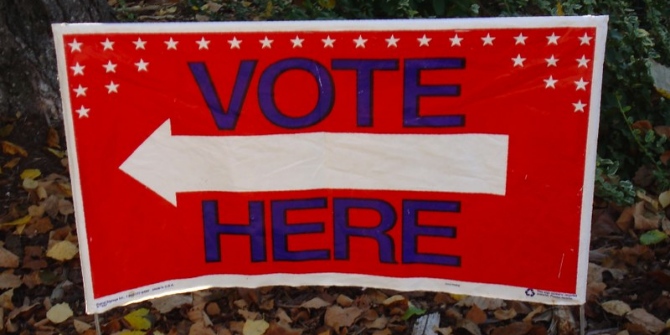 While the US presidential primary race is all but over, primary elections for down ballot races continue. Christopher A. Cooper takes a close look at the Republican primary for North Carolina’s 11th Congressional District. He writes that the departure of former Representative Mark Meadows to be President Trump’s Chief of Staff has led to an unusual race to replace him, with a second primary now underway which is being fought between two candidates with very similar policy profiles.
While the US presidential primary race is all but over, primary elections for down ballot races continue. Christopher A. Cooper takes a close look at the Republican primary for North Carolina’s 11th Congressional District. He writes that the departure of former Representative Mark Meadows to be President Trump’s Chief of Staff has led to an unusual race to replace him, with a second primary now underway which is being fought between two candidates with very similar policy profiles.
More than two months after North Carolina held its March 2020 presidential primary, the most interesting primary battle in the state, and one of the most interesting in the country, continues to rage. North Carolina’s 11th congressional district, located in the far Western corner of the state which lacks any large cities, had been the friendly home to Republican incumbent Mark Meadows since 2012. Despite recent redistricting that made the 11th slightly more competitive, Meadows was expected to once again skate easily to re-election, until he jolted the district and the country to attention, resigning his seat last December to become Chief of Staff to President Trump. The resulting battle to replace Meadows is still under way and what happens may tell us a lot about the shape of the country and the way elections are run moving forward.
The Timing
The intrigue surrounding the 11th congressional district primary surrounded not just the incumbent’s resignation, but the timing of his resignation. Mark Meadows announced his retirement from the US House of Representatives on Thursday, December 19, at 5:33 AM—30 hours and 27 minutes before the deadline to file for the seat, and three days after the deadline for candidates who had already declared for another race to withdraw and run in the 11th. Whether intentional or not, the timing of this decision effectively locked out experienced politicians and created a chaotic environment with no clear favorite and considerable confusion.
Hours after Meadows’ crack of dawn announcement, Democrats and Republicans alike raced to declare their candidacy, although one candidate, Lynda Bennett appeared to have a head-start. Bennett had never served in elective office before, but was active in Republican Party politics and, perhaps most importantly, was a close friend of Mark Meadows and his wife Debbie Meadows. While other candidates claimed to have no advance knowledge of Meadows’ decision, Bennett was ready with a press release announcing her candidacy the morning of Meadows’ declaration. Meadows himself did little to quell the suspicions that he had tipped Bennett off when he endorsed Bennett over the candidacy of his former staff-member Wayne King and multi-term state senator Jim Davis.
The First Primary
By the time the dust settled, the field included 12 Republicans, 5 Democrats, and 2 third party candidates, making it the third largest field of any congressional race in the country. The Democratic field favored Moe Davis, a retired Air Force Colonel, Judge, and Prosecutor at Guantanamo Bay. After the votes were tallied, Davis won handily with 47 percent of the vote (the next highest vote getter garnered 23 percent).

“Welcome to North Carolina” by Taber Andrew Bain is licensed under CC BY 2.0
The Republican results, however, were messier. Lynda Bennett received the most votes, but was shy of the 30 percent of the vote required to avoid a runoff (or a 2nd primary, in the language of North Carolina election law). While most observers had expected a runoff, the second-place candidate was indeed a surprise. Madison Cawthorn, a 24-year-old political novice from Henderson County earned 20.4 percent of the vote, barely edging out State Senator Jim Davis and setting up a second primary between Cawthorn and Bennett. Their geographic distribution of votes was also noteworthy. While Cawthorn only won three counties, his victories were clustered near his home in Henderson County, and included Buncombe County, the most populous county in the district. In contrast, Bennett won her home county of Haywood as well as 5 less populous counties. The remainder of the counties in the district were won by Jim Davis or Wayne King, the Meadows staffer.
The Second Primary
The second primary (rescheduled from May 12 to June 23 because of concerns around COVID-19), sets up an interesting race between Bennett and Cawthorn. Both candidates hold similar policy opinions—both have expressed their support for 2nd Amendments Rights, for Donald Trump, and their suspicions of Democratic politics. Their differences, therefore, are largely stylistic and a result of their very different personal profiles. Bennett has touted her business experience and prominent endorsements, which have come from high-profile conservatives including not only Meadows but also Texas Senator Ted Cruz, House Freedom Caucus Chairman Jim Jordan and, most recently President Trump himself. She has largely avoided local media appearances and opted not to participate in a candidate forum. While Cawthorn has appeared on Fox News, he has focused his appeal locally, critiquing the very D.C. connections that Bennett touts and arguing that his youth makes him better able to reach younger voters. Both candidates have raised several hundred thousand dollars, although Cawthorn has raised and spent more than his opponent.
The race is noteworthy, not only because of the stylistic contrasts between the candidates and the lineage of the seat, but also because of what it suggests about how campaigns may be run in the time of COVID-19 and what it says about the potential of mail-in voting. North Carolina election law does not provide for true mail-in voting, but does provide for no-excuse absentee balloting, where any registered voter can request a mail-in ballot and return that ballot by Election Day. At the time of this writing, there were three times as many mail-in votes cast as there were the same number of days before the first primary. This increase in mail-in-voting over the first primary is particularly telling, as turnout in the second primary is expected to trail far behind the first primary.
The Lessons
In the end, the results of this primary will tell us a great deal not only about the future of this district, but also about the dynamics of primary politics, the importance of election rules regarding runoff elections, and the potential increase in mail-in voting that may come as a result of COVID-19.
Please read our comments policy before commenting.
Note: This article gives the views of the author, and not the position of USAPP – American Politics and Policy, nor the London School of Economics.
Shortened URL for this post: https://bit.ly/3hDc6w1
About the author
 Christopher A. Cooper – Western Carolina University
Christopher A. Cooper – Western Carolina University
Christopher A. Cooper is Robert Lee Madison Distinguished Professor and Department Head in the Department of Political Science and Public Affairs at Western Carolina University. His research focuses on state and local politics, North Carolina politics, southern politics and elections in the United States.







1 Comments